Rick Wayne's Blog, page 54
February 26, 2019
(Art) The Fierce Gods of Kou Takano
[image error]
Kou Takano, AKA Kotako, paints fierce depictions of gods and dragons. Find more on ArtStation.
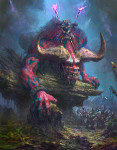





















February 25, 2019
(Fiction) Permission to do the right thing
[image error]
Hours passed, and Xana realized neither of them had bothered to turn on the light even as the penthouse grew dark. And Ian hadn’t moved or bothered to go to the bathroom. He just sat in his chair staring at the laptop on the ottoman in front of him. Every now and then his leg would start to bounce up and down or he’d scratch the bandages at the tip of his stub. Then he would become still again. And as the light from the window faded, the computer screen lit his face a blue-white while the rest of him disappeared into darkness, like a ghost.
Xana stood with a groan and turned the floor lamp on. “You’re awfully quiet.”
Ian looked up, but his eyes were far away. It took them a second to focus. That meant he hadn’t been reading the screen. He had been staring through it, lost in thought. For how long, she wondered.
“Everything okay?”
“Yeah.” He sighed. He looked back to the screen. “I mean no.”
“Which is it?”
Ian sat back. He rubbed his eyes with his only hand. He took a deep breath and let it out. “What if we’re wrong?”
“About what?”
“Everything. Cap. The plan. All of it.”
“How can you even ask that?”
Ian turned to the dark window and stared at it for a moment. “I’m not sure I can even do it justice.”
“Do what?”
“I’ve been sitting here looking through the files we got in New York trying to see if I could find anything about Prophet. And . . .” He motioned to the screen and made bug eyes. “I dunno. It’s just got me all tied up. The stuff they’re doing. Once you see. Once you understand. It makes a sick kind of sense.
“Remember that big school shooting out east a while back?”
“That was them?” Xana sat down on the couch. She lifted her 3XL T-shirt, which was still snug even though her breasts had become pecs, and inspected the bandages wrapped around her midsection.
Ian nodded. “Cap is right. They’re ghosts. They hide inside other stuff—shootings and car accidents and outbreaks of disease. Like a parasite you don’t even know you have.”
“What do you mean?”
“Okay, say they have something they want to do. If they do it themselves, there’s a good chance they’ll be seen. And they can’t be seen. So they have to get someone else to do it, but it has to be someone the authorities can easily believe acted alone, or for someone else. Like, they can’t leave a trail.”
“Otherwise they’ll be discovered,” Xana added.
“Right. So they start by screening a bunch of candidates, and by bunch I mean millions. Same way they found me. Online dating profiles. Social media accounts. All that stuff we don’t think twice about revealing online. Out of that, they select five individuals with oblique connections to their target. They snag these folks, so now they’re seeing everything these people see. They’re looking out on the world through their eyes. Every time they sneeze, or cheat on their taxes, or frickin’ go down on their lover, these people see it.”
Xana made a face. Ian was such a strange boy.
“Only these five candidates aren’t the most stable to begin with. They were picked because they all had some kind of extreme social anxiety or crippling depression. Exactly the people who gravitate to life on the internet in the first place.
“Now they start applying pressure. Trust me, it’s freaky to realize someone else is looking out on the world through your eyes. Anyway, eventually one of the five just snaps. They give him some orders, have him do some increasingly nasty but ultimately pointless things to desensitize him to violence and to establish a pattern of erratic behavior.
“When the time comes, they give the guy orders to kill as many people as he can, but he has to get three specific targets—all women, for example, which will fit this guy’s pathology. And he does it. By then, he’s so convinced that the world is laughing at him—everyone, everywhere—that he woulda launched World War Three if he could have.
“But of the three targets, two were red herrings. Totally innocent. Like a double-blind clinical trial, even the people planning the attack, his handlers or whatever, are completely insulated from any potentially biasing information. No one knew the reason for any of it.”
“Which was?”
Ian shrugged. “I don’t know. I haven’t gotten that far. These files don’t exactly read like a book. It’s all back-and-forth emails and ‘Action Updates’ and shit. But you want to know the scariest part? It’s not the shooting or how they killed the unused candidates, including one in a car accident that also killed a three-year-old child.
“It’s the tone. It’s how these people are just sending in status reports to their boss like it’s any other day at the office. I’m reading the case notes and I’m chilled. Like, literally.” He stuck out his arms. “It feels like my blood has pooled. I keep thinking, something has to be wrong with them. Normal people don’t do shit like this. Like, they have to be brainwashed or something, right?”
“Right.” Xana could believe that.
“Wrong.” Ian turned the screen around. “It goes back to the ’70s. Something called the Advanced Theoretical Working Group. A bunch of mathematicians and scientists and shit got together to talk about the Cold War and the environment and civil rights and all this stuff. Nothing formal, just like a social club for academics and geniuses. Hardcore scientists. Data geeks. They pool info from all these different disciplines and run the numbers, just to see what they can find out, and make this . . . discovery, I guess you’d call it. They prove it. Supposedly. I mean, I can’t understand the math, but if they’re right, then things really aren’t getting better.”
“Things?” Xana scowled. “What things?”
“Society. World culture. Human history. According to them, our species is literally incapable of escaping”—he turned the screen around again and read— “ ‘a stratified, hunter-gatherer-type competitive social order.’
“Most of us have this sense that things are getting better, especially versus, like, five hundred years ago or something. But what they showed is that that’s just an illusion. Things change, yes. But they change randomly. Since the industrial revolution, the world seems better off, but on any solid long-term measure, really it’s not. We purchased this momentary peace at the expense of a handful of catastrophic world wars, where tens of millions of people died—more than any war ever—and a now-inevitable global environmental collapse, where entire cultures will fall.”
Xana’s eyebrows knotted together.
“Where we are in history, it seems like things are settling down, like it’s all getting better. But it’s not. They proved it. And what’s worse, they proved that it’s because of us, of how we are. As a species.
“These people believe, as much as any of us might believe anything, that humans are going to keep killing each other, that the rich will keep exploiting the poor, that minorities will be repressed, that we’ll exhaust the planet, precipitate a massive extinction event, and on and on. Forever. Maybe some things are better some times and worse others, but it’s never, ever actually going to stop—or even tangibly improve in the geologic long run—because the function plot of our ability to be altruistic never reaches critical mass. The limit of the curve never crosses the Y-axis. It’s perpetually a negative number, so it’s mathematically incapable of matching the other variables in the equation. Do you understand?”
Xana nodded. Then she shook her head.
“The only way we’re ever good enough is in an environment of near-zero difficulty. Paradise. Which doesn’t exist.
“It’s exactly what Digby tried to tell me in California. People are cattle, he said. We’ll do a little to help each other, especially when times are bad, but that desire diminishes the more we perceive things have improved. Instead of a feed-forward mechanism, where we’re encouraged by positive change and so want to do more, and more, and more, it’s a feedback function. The better things get, the less we’re motivated, the less we do, and so we never reach that critical mass. We never hit the tipping point. As a species, we’re perpetually trapped in an alternating cycle of violence and oppression, randomly swinging from better to worse, forever and ever, for the rest of our entire existence.”
Ian took a deep breath. He had raised his hand to the ceiling. He dropped it and rubbed his eyes again. He walked to the kitchen and opened the fridge and poured himself a glass of orange juice. He chugged it and poured another.
Xana was quiet.
“So they decided to jack with the system. Engineer a different result. They don’t work for the wealthy and powerful. Digby was right about that, too. They manipulate them, same as everyone else, all to bring about the kind of utopia every science fiction writer has been dreaming about: the inversion of the power structure, the liberation of the working classes, freedom from oppression, a money-less economy, environmental sustainability, animal rights, the flourishing of the arts and sciences, all of it. That’s the endgame.”
He walked back into the living room with two glasses. “They’re not trying to destroy the world. Or conquer it. Or whatever. They’re trying to save it. Scientifically. Without appealing to morals or religion or anything. Without worrying about ends and means. It’s whatever works.”
He handed one of the glasses to Xan, who took it gingerly with two hands. They were shaking slightly.
Ian noticed it. “So yeah . . . The upper-echelon folks write these reports about the collateral death of a three-year-old without a hint of remorse. Because in their mind, no one is innocent. We’re the problem. It’s not the world. It’s us. All of us. We’re the only thing standing in the way of ourselves. So the only way to make things better for ourselves is to hurt us.”
He stopped. He took a drink. A long moment passed in silence.
Xana breathed in through her nose. “It’s almost Christian. In a way.”
Ian scowled. “What?” He walked back to his chair but he didn’t sit down.
Xana nodded. “That we are all sinners. That we are all flawed. In our souls. And that there is only one path to salvation.”
Ian looked out the window at the nighttime skyline of the city. It was gorgeous.
Xana drained the glass in three gulps. “Do you think they’re right?”
“No!” He turned. “They’re not right.” Ian paced in a small circle. It felt good to stretch his legs. “But . . .”
“But?”
“What if they’re not wrong? I mean, according to their formula, it only works if we don’t believe it’s happening. That’s why they’re so desperate to stay hidden. That’s why they’ve gathered folks with special abilities and shit, so they can do more with a smaller footprint. And it’s why they won’t give themselves a name. If they have a name, then they’re real. But if people start to believe they’re being manipulated, even for a positive end, they’ll fight it and the equation goes all out of balance again. Makes sense, right?
“But that raises the question . . . Assuming we even could—like, assuming we don’t die trying—do we have the right to stop something like this? I’m not saying what they’re doing is right. I’m just asking, is it our choice to make?” He sighed and sat down again.
Xana looked out the window at the dark water of the lake, a void in the night, revealed only by the distant shimmering reflection of the half-moon, perfectly split between light and dark. “When I was little, my father took care of everything. He worked so hard. So many hours. My schooling was not free. He had to pay. And always he did. No matter what, we always had food.
“When you are a child and everything is always provided, you don’t realize the cost. You take it for granted. So when I got older, I struggled. I wondered how he did it. It seemed to me that God was out there. How could He not be? It was the only way to explain why I was not starving in the street.
“Then I found out I was sick. I was growing and growing, and the doctors said one day I would die, not so long in the future. I was angry. For many years. The nun at my school said I held God like a fiery lover. With passion one day. With rage the next. I knew He was so great, but I couldn’t understand why He would do this. Not to me. To my son. Leave him without a mother.
“I decided after a long time that it was punishment. For being with Declun. Even though my body had already started changing when I sinned, I thought that, since God knows everything, since He sees all of time at once, like a photograph, that to Him it didn’t so much matter which came first. That I was going to sin, and so I was given a great burden. And that was why it had happened.” She stopped.
“And now?”
“You are not a Christian. You see a different world. To me, sometimes, it seems like you just don’t want to believe. That you refuse to see the obvious. Some people, you know, they make so many excuses to hold onto things they want to be true.”
Ian smirked. “That’s funny.”
Xana nodded. “I know you would say the same about me. But anyone confident in what they believe doesn’t care if other people think it’s silly.”
“I never said it was silly.”
Xana gave a small smile. “Not out loud.”
“Yeah.” Ian wondered what he had done. “I guess.” He had no idea.
“You expect others to give your point of view a respect you do not reciprocate. So many things happen that are clearly the work of God. Sometimes I feel like some people are just being children, and if you would just—”
“Children? Come on.”
“Let me finish, please.”
Ian took a breath. He reminded himself she’d just had open-heart surgery. He lowered his eyes to the floor and nodded. It was easier not to argue if he couldn’t see her face.
“But that’s not a Christian thing to believe. It’s not right for me to think that. It’s easy for those who know God’s love, who are wrapped in His grace every day, to feel special. And when we see people who refuse that, over and over, sometimes it is easy to feel superior, even if we don’t say it out loud. But that is not what Jesus taught.”
“Oh. My. God.” Ian’s head snapped up in epiphany. He realized where she was going. “You don’t think it is our choice. You think God brought us together. Don’t you? That’s where you were going. You think He made you this way, not as punishment, but because this is some kind of holy mission or something.”
“No. Not like you think. If God exists, then He knows everything, and so everything happens because He allows it. It doesn’t have to be a crusade. It could be as simple as going to the grocery store and helping a homeless man on the way.
“You said we are not in charge. But no one is in charge. Not really. I learned that in Guyana. Not the Faction. Not the captain. Or the man Prophet. Not the wealthy. Not even God. Because He has put us in charge of ourselves.
“What you said these people believe . . . It is not so different from what’s in the Bible—that we are all sinners. But they believe we don’t have a choice. They are not leading us to salvation. They are forcing it on us.
“I don’t believe in that. It goes against everything Sister Rosa taught me. About life.
“We do have a choice. Otherwise God could not punish us for anything.
“What they are doing is wrong. It doesn’t matter what they intend. Their plan is a cheat. Like those people who want to force others to stop sinning. To put them in jail if they are not Godly.
“You ask if we have the right to stand against them. I think, if we have to ask, then we have already lost. No one has to ask permission to do the right thing. No matter what the law says, or the church, or whatever.”
Ian sat back. He took a drink. “Wink was cheating, you know. At those games we played. Over and over. Back at the garage. She re-coded the game cartridge. She said it wasn’t cheating because she was just using her skills to win the game, no different from anyone else. It just so happens that she’s a tech genius.”
“It bothered you?”
“Only that she didn’t tell me. I mean, the implicit conditions of the game had been changed. In secret. And I wasn’t given the choice of whether I wanted to play that way or not. So, yeah.” He nodded.
Xana looked at him curiously. “What?”
“It’s just, I used to game a lot. Before I had to work to pay off my student loans. There are all these cheat codes out there, ya know? Codes you can find online that make you invincible or give you unlimited money or open a shortcut through the dungeon. I used them all the time, especially when I was a kid. Junior high. High school.
“But by the time I got to college, that didn’t seem fun anymore. What was the point of playing the game if you were just gonna cheat your way through it? I mean, it’s fun to do every once in a while, sure. Just for something different. Just to see where it goes. But it seemed to me then, and even more so now, people who do that all the time don’t really like gaming. They like winning. And that’s different.”
Ian looked at his stub. He looked at the canister in a plastic bag by the door. “Why did you save it?”
Xana turned. She looked at her heart. She turned back to the window. “It seemed wrong to just throw it away.”
“You know. I had a lot of time to think while you were out. About almost dying. Losing an arm. I don’t want to use the cheat codes anymore. I don’t wanna take the shortcut. Because it’s not about winning.”
Xana smiled serenely at her friend. “We can agree on one thing at least.”
excerpt from my previous novel, THE MINUS FACTION, prompted by watching M. Night Shyamalan’s “Glass,” which operates in the same space as the book but which I think tried to do too many things too slowly.
February 24, 2019
(Art) The Soaring Fantasy of Victor Adame
[image error]
Victor Adame is a fantasy concept artist with a significant body of work in gaming, including for Wizards of the Coast, illustration, and book covers. More of his work can be found on his website.
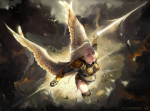


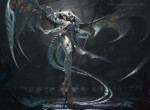


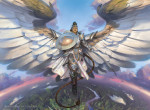

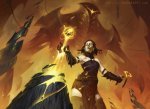


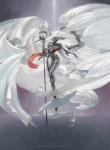


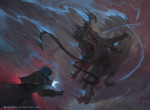
February 20, 2019
Sayonara all over again
[image error]
This is a poster for the Kyoto Grand Exposition in Commemoration of the 1928 Imperial Coronation. Given the nationalist path Japan subsequently took, it’s hard not to read this as pure imperialist propaganda. And it is also that.
Almost a century later, in 2025, Osaka will host another Grand Expo. Next year, Tokyo will host the summer Olympic and Paralympic games. Both cities are investing heavily in their infrastructure, preparing for the eyes of the world to be on them.
For those who don’t know, I’ve been splitting my time between Japan and the US for most of the last five years. I am returning now from another visit — this time just two months.
Japan is, for the Westerner, without a doubt the most relentlessly foreign country on the planet. Young people with no responsibilities — recent college graduates, mostly — flock there in search of canned adventure, a sanitized urban safari full of exotic but ultimately safe experiences.
Indeed, The Economist once described Japan as a Disneyland-like nation where everyone is not only painfully accommodating but seems to have a precise role to play, where the streets are perpetually landscaped and clean, where the trains run regularly and on time (but not so late as to encourage any mischief), and there’s a neon light show every evening.
In my experience, most Westerners don’t get past that. Many fall in love with the image of herself portrayed in anime and manga, which is exactly like falling in love with the Disney version of America (which many Japanese do).
I’m fortunate to have gotten a backstage pass. I’ve written here about the country and where she stands at this point in her history. But for me, it’s home, and I leave my heart there in the care of someone very special.
February 17, 2019
Kirby vs. Steranko
[image error]
Kirby vs. Steranko
[image error]
February 15, 2019
(Art) The Patent Horrors of Oleg Vdovenko
[image error]
Digitally rendered scenes of terror by Russian artist Oleg Vdovenko, lit as if by a camera flash in the darkness. I find that cover image to be somewhat iconic of our time.
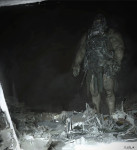
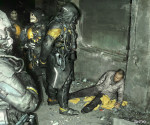
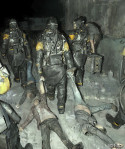
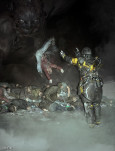

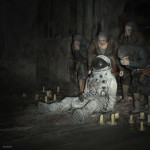
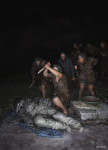
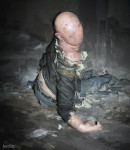
February 13, 2019
(Fiction) Storybook Epic Fail
[image error]
For eight and a half heady weeks, Kell worked as a sales rep for a liquor distributor, which was arguably the best job she ever had and probably ever could have. It was definitely the only job she was qualified for. I’m sure there was more to it than this, but the way she described it, she basically got paid to bar hop. Her boss straight up asked her to spend her nights hanging out in random bars drinking and getting to know the bartenders, and of course occasionally plugging her company’s business. He understood, I think, that one distributor was pretty much like another. What he was offering these guys were regular chances to hang out with a pretty girl while on the clock. It should’ve been a slam dunk for her and an easy route to credit card bills, overdue utility payments, and overpriced rent in a share house way out on Long Island. Alas.
I’d love to say she ended up getting fired for some storybook epic fail—crashing an ice cream truck full of stolen whiskey into a daycare center while fleeing the police with her accomplices: a disgraced Mafia hitman, four flamboyant strippers of uncertain gender, and a tattooed donkey named Manuel whose skin bore a map to treasure buried in the deserts of Mexico by Sancho Panza himself. Really though it was because all she did was party and never ended up selling anything. Toward the end of her first month, she panicked. To keep her boss from finding out, and give herself one more chance, she used her ample feminine wiles to convince a couple of the bartenders she’d met to put in big orders and then avail themselves of the company’s cancellation policy a few days later, after the month had closed, making it look—for a few weeks anyway—like she was at least minimally competent.
She didn’t wait around to get fired after the second month. She just stopped showing up. For a few weeks after that, she shacked up with one of the bartenders, Shandra. That, too, should’ve been a sweet deal. Shandra wasn’t just a bartender, she was a bassist in a moderately successful local band, and she really liked Kell and probably would have let her stay indefinitely if she hadn’t come home late from a gig where Kell failed to show and found her on the couch riding this six-foot-two guy named Yantos, who she hooked up with from time to time. Dude looked like Frank Zappa if Frank Zappa had played in the NFL. I’m reliably informed he had a very large penis. Shandra didn’t kick Kell out right away. After all, her and Kell weren’t officially an item. But according to Kell it was hella awkward after that, and once it was clear that, as far as Shandra was concerned, there was no going back to how things had been, Kell moved on again.
Naturally, in my shotgun attempt to find her, I reached out to all those people, as well as quite a few more, which felt completely like sailing in the wake of an oil tanker. Kell had cut a path through all those people’s lives—and churned them to froth. Most had yet to fully recover and went from being happy that she was in trouble to hopeful that it might somehow bring them back to her. It was a little distressing, though, how few of them had heard of me. Kell was apparently very skilled at compartmentalizing her life. I learned real quick that referring to myself as her best friend did not, as I had hoped, encourage anyone to open up to me. It only invited suspicion. By the time I found Yantos selling stolen bric-a-brac on a blanket near St. Mark’s Place, my story was that her grandmother had died and left her some stuff and her parents had called me in a desperate attempt to track her down. Most people knew Kell had problems with her parents, especially her dad, but who doesn’t like dear old grandma?
By the second day of that, I’d had enough. I did the friend bit, I decided. It wasn’t my fault she was playing Jimmy Hoffa. Enough people knew that I was looking for her that I figured whenever she finally came up for air, one of them was bound to steer her my way. Truth is, I was feeling guilty about the whole thing. More than once, I caught myself dreaming on the train about what I would do with my share of the money—if for some stupid reason it turned out not to be a scam—and that made me sick. That’s how they do it. Rich people. That’s how they get everyone to go happily along with all their shit. I wanted a do-over. I wanted to go back to Lykke’s house and throw that heavy stack of money in his face. Or better yet, make him eat it. I had no idea how I would possibly do that, but dreaming about all the various ways he might meet a vile end was better than dreaming about all the ways I was up for sale.
rough cut from my forthcoming occult mystery, FEAST OF SHADOWS.
cover image by Tran Nguyen
February 12, 2019
Weaponized Agnosticism
[image error]
It may seem odd in an era of “post-factualism” to question the value of skepticism. A commitment — we won’t call it an obsession — with proof and rules and facts seems like the perfect antidote to an epidemic of believe-it-yourself reality.
On the whole, skepticism is generally a good thing. In its purest form, however, skepticism is just another kind of denial — the ultimate denial, a denial of everything, the intellectual equivalent of a petulant four-year-old who demands you give reason after reason and who won’t lift a finger until the world is described to their satisfaction.
As with the child, there’s no reply to the committed skeptic, which is exactly what makes its weaponizers so slippery: no matter who they’re talking to, they can always claim the more open mind. (See Barry Stroud’s “The Significance of Philosophical Skepticism,” or any of a handful of other scholarly works on the subject.)
In as much as human beings don’t know everything, eventually we run out of facts and have to make do with uncertainty. Overcoming that takes risk, but these fellows are not, or tend not to be, explorers or artists or builders of theories. Their defining trait, as hoarders of fact, is that they take no risk, indulge no folly that may later turn out to be true. They build fortresses of rules at every frontier and charge passage in the name of an empty-minded god.
A thoughtful skepticism is doubtful, not just of belief but of doubt itself.
art by Jason Murphy
February 10, 2019
(Art) The Perverse Paraphilias of Trevor Brown [Very NSFW]
[image error]
English artist Trevor Brown, who works and resides in Japan, has planted his flag in the narrow hinterland between conventional pop surrealism and taboo paraphiliac erotica.
paraphilia. [par″ah-fil´e-ah] a sexual disorder characterized by recurrent intense sexual urges, sexually arousing fantasies, or behavior involving use of a nonhuman object, the suffering or humiliation of oneself or one’s partner, or children or other nonconsenting partners.
The prefix “para” means outside of, apart from, beyond, which is an attempt by the medical community to define these feelings as abnormal, something to be fixed or eliminated.
They are certainly unhealthy. Some would be dangerous or criminal if ever acted out — not that that is ever the point of fantasy.
There is a genre of manga in Japan, for example, called guro, from the English word gore, that features stories of young girl being abducted and either maimed or mutilated. Although they do sometimes die in the end, it is not a category of “snuff” in that the fetish is not death but dismemberment — quite literally. The girls are often left with their arms and legs removed.
[image error]
Such imaginings are abhorrent. But they also seem to be recurrent elements of the human psyche, ones that won’t simply go away for wishing it, and that makes them as valid a subject for art as any other, if not more so for forcing us to consider the inconsiderable.
I see these urges much like smallpox or influenza. Both are “natural” in that they result from the normal function of evolved microorganisms. Same for cancer, which existed long before the chemical industry.
That doesn’t make any of them good, healthy, or desirable, and we may validly want to be rid of them, just as we want to be rid of cancer, which is destructive and unplesant. What we cannot do is deny they are part of the world — or blame them on weakness of constitution. Something else is at cause.
[image error]
Brown’s subjects are almost always prepubescent girls, which is apt since they are our paradigms of innocence, and he presents them in an anime style, full of round edges and soft colors, thereby visually associating them with children’s media, which amplifies the sheer incongruity and feelings of unease.
They are, however, not simple objects in the pornographic sense. In fact, in Brown’s art, they are often the perpetrators, which I find even more disturbing than the reverse.
I couldn’t tell you what Mr. Brown hopes to achieve with his art. I’m not sure any body of work has one explicit interpretation anyway, or even that the artist’s intent matters to our experience of it.
The reason I find his works alluring is that they poke and caress an uncomfortable wrinkle in my psyche. I am discomfited when I see them, and in as much as good art provokes — an emotion, an outcry, praise, derision — in that at least, his work succeeds, however you feel about the rest.
In this case, I am hosting the gallery of images on my website rather than this blog, which is operated by WordPress. I’m not sure this work doesn’t represent a violation of their terms of service. Please don’t click if you are a sensitive person or otherwise easily offended.
The old ones are patient, and not so easily fooled.
Afte...
[image error]
The old ones are patient, and not so easily fooled.
After the death of Solomon, wisest of rulers, the kingdom of the Hebrews was distributed equitably among his heirs, who distrusted each other as mightily as their father was wise. Swiftly they fell, with many other lands, to the conquerer, Nebuchadnezzar of Babylon. As was his practice, the new king took hostage every male youth, both high-born and . . . . . . were marched east to study the Chaldean sciences—what the Hebrews called ‘the black arts’—in the hopes that a whole generation would be converted to the Babylonian faith and return to the lands of their ancestors to marry, multiply, and so to erase without bloodshed the famously fanatical cult of Yahweh. For above all, Nebuchadnezzar desired a Babylon eternal and would brook no rivals.
It was one of these sons of Abraham, a boy named Daniel . . . with . . . excelled at his studies above . . . and was allowed to interpret the king’s dreams, an honor normally reserved for the High Priest of the Temple of Marduk. So impressed was Nebuchadnezzar that he dismissed his ministers’ objections and kept the young man’s counsel day and night, walking with him through the hanging gardens he had built to please his fickle queen . . . had barely noticed them. The king no doubt disliked what he heard, for Daniel referred to him as ‘the destroyer of nations’ and said Nebuchadnezzar’s own kingdom, his great and unprecedented legacy which surpassed even the mighty empires of Sumeria, would crumble and fall and be supplanted by mightier empires still, over and over, until at last a pinnacle was reached, a precipice from which the world itself would tumble back into darkness. Such was the arrogance and folly of the course the king charted.
The Book of Daniel is full of prophecies like that, some as opaque as a pale mirror. It’s only with . . . You can believe Daniel was a charlatan, or you can believe that his vagary was intentional, that he had witnessed something so terrible, so frightening, he dared not say it outright. For in truth, Nebuchadnezzar was vexed by visions beyond reason . . . He prayed to his gods first, as all men do. He prayed to the sky god Marduk, who had slain the many-headed dragon and so forged civilization out of chaos. He prayed to Enki and Ishtar and Enlil. But the gods and goddesses of Babylon were as silent as their stone-walled temples, as still as their marble-faced statuary, and the king despaired.
In righteous anger, Nebuchadnezzar demanded his priests call upon different gods, older gods still whose names had passed from memory but whose crypts could still be found deep under the twice-ancient cities of Ur and Uruk. And so archaic seals were broken and relic hymns were sung and fresh sacrifices made numbering in the . . . of thousands, and a narrow portal was forged, no wider than a pinprick such that no evil could slip through, and across it, the old gods, whose names were blighted by men, were summoned in parlay.
After a gap of thirteen days, they answered, and a deal was struck. The Nameless, the ancient lords of the earth, promised the king that his beloved Babylon would never die. He had only to record a tome, which would be whispered to him, one chapter at a time, over a period of six days and six hours and six minutes—a gift to all mankind from the emperors of the high dun.
The king agreed and set . . . as an infliction . . . But Nebuchadnezzar was no fool. He knew that which was whispered to him was nothing less than a return to ancient bondage, the architecture of eternal night. So he locked himself inside his treasury, the most secure vault yet constructed, there to trick the tricksters. He honored his bargain but recorded the tome in a language that had never been spoken: its alphabet, his own devising; its grammar, allegory; its syntax, so recursive and arcane that he had hope it might never be deciphered. And when finally he emerged, shrunken and disheveled, to test his invention before the wisest men of his court, he found there were none who could decipher it, not even the brilliant Daniel, and Nebuchadnezzar rested, believing he had . . .
But even a king is human, and in the years that followed, Nebuchadnezzar could not easily forget the murmurings he had heard in the dark, nor the strange and abominable recipes he had transcribed into a stillborn tongue. In the end, history records that King Nebuchadnezzar went mad and took his own life and . . . There is no mention, by Daniel or any others, of the book he composed while locked away, feverishly scratching until his reed split and his fingers cracked and his own blood flowed as ink. . . . but they knew of it, and its dark purpose. That is why Daniel had called the king ‘the destroyer of nations.’ It was why he filled his eponymous chronicle with cryptic warnings about the end of days. For he dared not speak the truth. He dared not reveal to the world that such a book existed. For in the king’s madness, the Book of Shadows, as it was called, had disappeared . . .
As for Babylon, she is the name long given to decadence, which rules everywhere.
—translated from the German by Reinhardt Stolz



